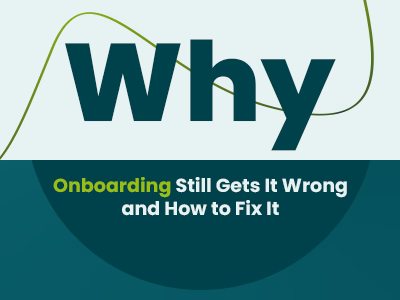Getting hired is just the beginning. How employees are welcomed, trained, and integrated into their new workplace can make or break their long-term success. To better understand how onboarding affects performance and retention, we surveyed 1,011 employees hired within the last two years. The results reveal where companies are falling short and what they can do to create a smoother, more effective start for new team members.
New hires don't all walk away from onboarding with the same impression. Some feel equipped and welcomed, while others leave confused or even regretful. A closer look shows how different groups interpret their early experience and how that impacts confidence on the job.

First impressions matter, and while some employees had a positive experience, many were left disappointed with their new employee training. About 46% of recently onboarded employees described the process as warm and welcoming, and 34% saw it as well-structured. However, nearly 3 in 10 called it disorganized, and over a quarter said it felt rushed.
Generational and work environment differences shaped these experiences. Gen X employees were the most likely to describe onboarding as disorganized (37%), while Gen Z was the most likely to describe it as exciting (31%). On-site employees were more likely to say the experience felt rushed (28%), while remote employees most often found it underwhelming or confusing (23% each).
Confidence in role readiness also varied widely. Just 27% of employees said onboarding prepared them very to extremely well for their position, and 38% felt moderately prepared. Gen Z employees were the most likely to report feeling very prepared (32%).
Interestingly, 1 in 4 new hires felt confident in their role within a month, yet 23% took more than 6 months or still don't feel confident. On-site employees were nearly twice as likely as their remote counterparts to feel confident within the first month. Overall, 67% of respondents believed their onboarding didn't fully reflect their actual job responsibilities and company culture.
A poor onboarding experience is frustrating, and surprisingly, it can push employees to reconsider their future with a new company. Our findings show a direct connection between how onboarding is handled and an employee's desire to stay or leave.

Nearly one-third of employees onboarded within the past 2 years were already considering quitting within the next 6 months. The risk was even higher among Gen X workers (36%), remote employees (35%), and managers (35%). Finance professionals were especially likely to be eyeing the door (36%).
The data paints a stark picture. Nearly half of those with a poor onboarding experience (48%) plan to leave—that's twice the rate of those who had a positive experience. On the other hand, 39% of employees said effective onboarding increased their desire to stay with the company long term. This figure jumped to 55% among those who had a good onboarding experience and fell to just 10% for those who didn't.
Gen Z showed the highest agreement that onboarding impacts long-term commitment (42%). When asked what frustrated them most during the onboarding process, employees pointed to unclear expectations (39%), lack of training (38%), and technical issues or delays (33%).
Perhaps most notably, over 1 in 5 respondents (21%) said a better onboarding process would have improved their overall opinion of the company. That sentiment was strongest among remote workers (25%).
Onboarding shouldn't be a one-and-done event. Done well, it lays the groundwork for long-term engagement and alignment. Many employees are open to evolving the process to keep their connection strong beyond the first few weeks.

Over 3 in 5 employees (61%) believe onboarding significantly impacts their future performance and engagement. Those working at small businesses (10–49 employees) were the most likely to agree (66%).
The benefits of good onboarding extend beyond the first month. Among employees who experienced a strong onboarding, 77% said they felt more connected to their company now than they did at the beginning. For those with weaker onboarding, that number dropped to 65%. Remote employees reported the lowest increase in connection at 68%.
To address lingering gaps, many workers support the idea of a "re-onboarding"—a formal reset 6 months into the job to reinforce goals, culture, and growth. Seven in ten employees favored this approach, with support highest among Gen Z and Gen X workers (73%), remote employees (73%), and those at large companies (73%).
Companies have a golden opportunity to improve employee retention, satisfaction, and performance through effective onboarding. When onboarding is rushed, vague, or disconnected from real responsibilities, it not only hurts confidence but also drives talent out the door. For modern teams, especially remote ones, a well-structured and accurate onboarding experience may be the most important investment an organization can make in its people.
Methodology
For this study, we surveyed 1,011 employees in the United States who were hired within the last two years. Respondents were asked about their onboarding experiences, including the positives and negatives, and how they believe the process could be improved.
About Software Finder
Software Finder helps business leaders find and compare the best software solutions for their unique needs. From HR platforms to project management tools, Software Finder connects decision-makers with in-depth insights and tailored recommendations to make smarter software investments. Learn more about our HR software rankings today.
Fair Use Statement
If you'd like to share or report on this article's findings, you are welcome to do so for noncommercial purposes. Just be sure to include a link back to this page and credit SoftwareFinder.com appropriately.
